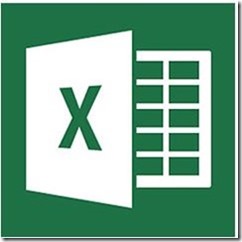 That’s a rather bold title I know but having read a rather entertaining piece on 8 Bit Dad titled, An Open Letter to My Son About Microsoft Excel. It got me thinking about how Excel actually had quite an impact on my career.
That’s a rather bold title I know but having read a rather entertaining piece on 8 Bit Dad titled, An Open Letter to My Son About Microsoft Excel. It got me thinking about how Excel actually had quite an impact on my career.
Back when I was in college I had a part time job at a metal pressing factory. My job was to help the quality department who were in the process of implementing a quality standard. I was tasked with creating various forms and spreadsheets for the team as well as providing general IT support to the rest of the factory.
The manager of the IT department needed to create a weekly chart showing waste figures to add to a notice board and he asked me to try and make this as simple as possible (he was the first to admit he struggled with computers). The biggest problem with this was that the figures came from a old unix based ERP system. Each week the production team would give him a floppy disk with some files on that would need to be imported into Excel, formatted correctly and turned into a chart.
So I created a template for him with the idea being that once a week he’d copy that file, rename it, run through the import process in Excel, copy and paste the figures into the right place, select the chart page and press the print key
Sound simple enough?
Nope.
That was too much for him. My instructions were to make it “Trevor-Proof” (that was his name…yes he actually said that)
So I went back to the drawing board and hit on the idea of using macros. I then realised that behind the scenes macros were actually automatically generated Visual Basic code (Visual Basic for Applications) and it didn’t take me long to figure out that I could record a macro to broadly follow the steps Trevor needed every week and then tweak the code to make it more generalised and hook it up to some buttons I’d placed on the front sheet.
This worked perfectly! Each week Trevor would open the same file, He’d insert the disk, press a button and It would guide him through the steps automatically and spit out the printed document.
He loved it and it worked a treat!
Luckily for me even though the team weren’t all that computer savvy they were able to see lots of other possibilities for doing similar things and my days then largely consisted of developing increasingly complicated Excel “applications” for the business and getting to know Excel and Visual Basic inside out. Soon every department was running at least one of these applications on a daily basis.
Before long I was approaching the end of college and I’d started to apply for various IT support jobs and along with my CV I’d included some details and examples of the things I’d been developing. Out of the blue one of the companies I’d previously had an (unsuccessful) interview at called me. They’d had a developer leave and wanted to know if I was interested in applying.
I didn’t actually consider myself a developer/programmer. I’d been looking for support jobs as that was what I was interested in but I’d included the stuff in my CV to show some of the skills I’d learnt.
So I went for the interview and before i knew it I’d got a full time job coding. Moving from VBA to "full fat” Visual Basic wasn’t a huge leap and I also did some Visual FoxPro later on.
Development wasn’t their primary focus though. They provided support to local small businesses and this was where my first exposure to Small Business Server came in. It wasn’t long before I was getting more involved on the support side of things and was duly sent off on the MCSE courses and I guess the rest is history!
I never saw myself as a “real” developer so it was only natural I’d move back to what I’d started out doing. A lot of the skills I learnt during that time are still relevant now though. I have a better understanding of what goes on “under the hood” of software and writing scripts (batch, vbscript, powershell) is something that I regularly need to do.
So there you go, if it hadn’t been for Excel giving me that initial foot in the door I wouldn’t have ended up where I am today. It’s not a conventional route into the IT industry but it worked out ok for me.
Latest posts by Andy Parkes (see all)
- Dishley parkrun, Loughborough - August 1, 2023
- Woodgate Valley Country Park parkrun - July 22, 2023
- Abbey Park parkrun - June 8, 2023
